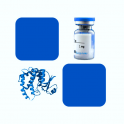
- Remove this product from my favorite's list.
- Add this product to my list of favorites.
Products
Newsletter
 |  |  |  |  |  |

Background
Colony stimulating factor 1 receptor (CSF1R) is also known as macrophage colony-stimulating factor receptor (M-CSFR), CD115 Cluster of Differentiation 115 (CD115), C-FMS, CSFR, FIM2, FMS, and is a member of the typeⅢ subfamily of receptor tyrosine kinases (RTKs). CSF1R is a receptor for a cytokine called colony stimulating factor 1, The protein encoded by the CSFR1 gene is the receptor for colony stimulating factor 1, a cytokine which controls the production, differentiation, and function of macrophages. This receptor mediates most, if not all, of the biological effects of this cytokine. Ligand binding activates CSFR1 through a process of oligomerization and transphosphorylation . Mutations in CSF1R are associated with chronic myelomonocytic leukemia and type M4 acute myeloblastic leukemia. Increased levels of CSF1R1 are found in microglia in Alzheimer's disease and after brain injuries. The increased receptor expression causes microglia to become more active. Both CSF1R, and its ligand colony stimulating factor 1 play an important role in the development of the mammary gland and may be involved in the process of mammary gland carcinogenesis.
Source
Recombinant Mouse M-CSF R, Fc Tag (CSR-M5256) is expressed from human 293 cells (HEK293). It contains AA Ala 20 - Ser 511 (Accession # NP_001032948).
Predicted N-terminus: Ala 20
Molecular Characterization
This protein carries a human IgG1 Fc tag at the C-terminus.
The protein has a calculated MW of 81.8 kDa. The protein migrates as 100-130 kDa under reducing (R) condition, and 260 kDa when calibrated against Star Ribbon Pre-stained Protein Marker under non-reducing (NR) condition (SDS-PAGE) due to glycosylation.
Endotoxin
Less than 0.1 EU per μg by the LAL method.
Purity
>95% as determined by SDS-PAGE.
Formulation
Lyophilized from 0.22 μm filtered solution in 50 mM Tris, 100 mM Glycine, 25 mM Arginine, 150 mM NaCl, pH7.5 with trehalose as protectant.
Reconstitution
Please see Certificate of Analysis for specific instructions.
For best performance, we strongly recommend you to follow the reconstitution protocol provided in the CoA.
Storage
For long term storage, the product should be stored at lyophilized state at -20°C or lower.
Please avoid repeated freeze-thaw cycles.
This product is stable after storage at:
-20°C to -70°C for 12 months in lyophilized state;
-70°C for 3 months under sterile conditions after reconstitution.
Bioactivity
Please refer to product data sheet.
(1) "Guidelines for outpatient administration of naxitamab: Experience from Atrium Health Levine Children's Hospital"
Trovillion, Michael, Jordan et al
Cancer Med (2024) 13 (3), e7045
(2) "Exploring causal correlations between circulating levels of cytokines and colorectal cancer risk: A Mendelian randomization analysis"
Meng, Sun, Shi et al
Int J Cancer (2024)
(3) "Investigating the molecular mechanism of traditional Chinese medicine for the treatment of placental syndromes by influencing inflammatory cytokines using the Mendelian randomization and molecular docking technology"
Huang, Cai, Ling et al
Front Endocrinol (Lausanne) (2023) 14, 1290766
Showing 1-3 of 1448 papers.
Follow us